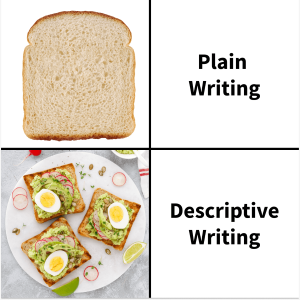Plain writing: The flowers were pretty.
Descriptive writing: The colorful flowers brought life to an otherwise lifeless sidewalk. The different shades of the green stems and leaves were the perfect backdrops to the yellow, orange, and red petals that seemed to sway softly with the breeze.
Writing With Details
Imagine this: It’s lunchtime, and you’re hungry. You sit down to eat at a restaurant and are surprised to see there are only two options on the menu. One is a single piece of room-temperature bread. The other is toasted bread with avocado, onions, peppers, scallions, and a fried egg on top of it. Which option are you going for?
Think of the room-temperature bread as writing that lacks descriptive details. The avocado toast? That’s descriptive writing that leaves your readers satisfied. Intrigued? Continue reading below to learn more about what descriptive writing is, why it’s important, and how to include it in your writing.

What Is Descriptive Writing?
So, what exactly is descriptive writing? It’s when you immerse the reader into your writing, whether you’re describing people, places, objects, or scenes. Descriptive writing allows the reader to paint a picture in their head. Descriptive writing makes your text more appealing and therefore draws in the reader.
But which type of writing benefits from descriptive writing? Nearly all of them do; especially creative writing. You’ll want to steer clear of descriptive writing in technical papers or academic writing. Unless, of course, your academic paper is about literature or writing. Professional emails also shouldn’t include descriptive writing. For example, if you’re sending an email to your boss explaining that you’re home sick, the last thing you want to do is add details.
Why Is Descriptive Writing Important?
There are many writing hacks you could use that’ll improve your text. Using descriptive writing can help enhance your text for many reasons:
- It brings your writing to life.
- Readers better understand and envision the message you would like to convey.
- It makes your writing fun to read.
- Lastly, it strengthens your abilities as a writer by forcing you to be more creative.
How To Be Descriptive In Your Writing
There are several ways to use descriptive writing in your text. We’ll cover a few of them below and provide examples.
1. Engage senses by using details.
Adding specific details helps your readers visualize what you’re writing about.
↓
As soon as I walked into the bakery, I was greeted by the warm, intoxicating air of freshly baked cookies.
2. Use precise synonyms.
Some words are more accurate than others and can help you better portray what you’re writing about.
↓
She wore a scarlet-colored dress.
3. Use metaphors, similes, personification, or other figures of speech.
Figures of speech can make your writing more relatable and easier to understand.
↓
I felt like a young boy on Christmas morning getting ready to open all his presents.
It’s All About the Details (As Well as Correct Spelling and Grammar)
Descriptive writing can make your writing magical. It can transport your readers from their sofas to whatever it is you’re writing about. But as powerful as descriptive writing can be, it cannot undo the negatives brought upon by spelling and grammar errors. That’s why it’s always a good idea to use LanguageTool as your writing assistant. Not only will this multilingual text editor detect and correct errors, but it will also provide the synonyms you need that’ll help make your writing more descriptive.

